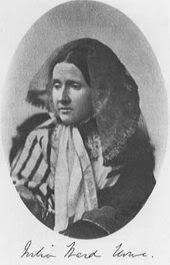Julia Ward Howe was inducted into the Songwriters' Hall of Fame in 1970
In 1843 she married a hero of the Greek revolution, physician Dr. Samuel Gridley Howe nicknamed Chev, who founded the Perkins Institute for the Blind. The couple made their home in South Boston, had six children (five of whom lived to adulthood), and were active in the Free Soil Party.
Howe's "Battle Hymn of the Republic", set to William Steffe's already-existing music, was first published in the Atlantic Monthly in 1862 and quickly became one of the most popular songs of the Union during the American Civil War.
After the war she focused her activities on the causes of pacifism and women's suffrage. She was a member of the Unitarian church.
In 1870 she was the first to proclaim Mother's Day, with her Mother's Day Proclamation.
From 1872 to 1879, she assisted Lucy Stone and Henry Brown Blackwell in editing Woman's Journal.
On January 28, 1908 Julia Ward Howe became the first woman elected to the American Academy of Arts and Letters. She died of pneumonia.
Julia Ward Howe is buried in the Mount Auburn Cemetery in Cambridge, Massachusetts.
Julia Ward Howe was inducted into the Songwriters' Hall of Fame in 1970
